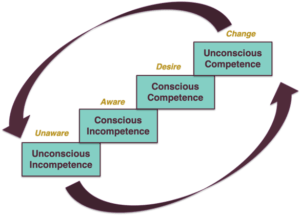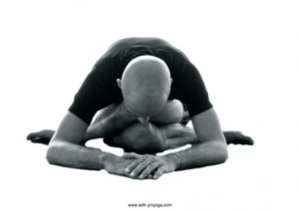The term “trust the process” is one that is often heard within the sphere of coaching, in fact I have used it myself when teaching coaching skills, along with other related terms such as “trust yourself, trust your client…trust the process”. In all honesty, when it was first said to me as a student of coaching, I didn’t quite understand it as I was still so fixed on trying to learn and of course, ‘master’, the skills of coaching. Over the years, I have gradually developed a greater understanding of what I think this means and one of the most important aspects of my own learning is that I have come to realise that trusting the process, is indeed an ongoing process in itself!
Part of that trust comes from ‘letting go’… perhaps in the case of coaching, it could be letting go of the need or desire to perform, to fix, to solve. I have previously talked about this in my blog Let Go, however it is a topic that continues to intrigue me as it is often so elusive and challenging to achieve with any form of consistency (hence my reflection that it is a process of its own). I am therefore sharing more thoughts on this as my own understanding continues to evolve.
I recently took inspiration from a book I am reading called The Daily Laws by Robert Greene. Greene actually includes a piece on “trust the process” where he gives the example of learning a skill such as playing the piano. At first everything about the piano and playing it seems somewhat alien and difficult: keys, keyboard, chords, pedals etc. Our initial excitement to learn and ‘master’ the skill can be overshadowed by boredom, fear, impatience, and confusion as we realise there is more to this than meets the eye. When these feelings dominate, our openness to observe, notice, reflect, practice, and learn are stunted. How many times do we start to learning something new and then stop? The process comes to a halt.
However, Greene advocates that, if we can learn to manage these emotions and allow time to take its course, “something remarkable begins to take shape”. By continuing to observe, learn from others, practice, and experiment, things begin to become clearer, we learn the ‘rules’, and we see how things fit together. Our practice helps us to become more natural and fluid and we can stretch and challenge ourselves further to deepen our knowledge and our skill. We gain more confidence, and, over time, we transition from student to practitioner and, instead of just doing what we have been told, we start to bring our own unique style and flair to our work. It is this transition that inspired me to call our foundational coach training programme The Science and Art of Coaching.
In a recent coach training cohort, I was discussing the term ‘self as instrument’ with students and one of them very helpfully and insightfully described a metaphor that came to her. She said there is a difference between learning to play an instrument in terms of keys, strings, note, chords etc. and learning to finely tune the instrument, connect with it and have a natural, fluid relationship with it – that is when the music played takes on a very different, more natural, and beautiful tone. Greene describes this as when we stay faithful to the process of continual learning and practicing, the instrument is no longer something that is outside of us; it is internalised and becomes part of us. He says: “we have learned the rules so well that we can now be the ones to break or rewrite them”.
Many of these developmental approaches are positioned as being part of the pathway to ‘mastery’. Personally, I feel a level of discomfort with this word as, at least to me, it implies a level of dominance over something. I liken it to the risks associated with becoming ‘unconsciously competent’ at something – a state that can so easily lead to complacency and assumption, which in turn can take us right back to ‘unconscious incompetence’! I prefer the word ‘alchemy’ which can be defined as a “seemingly magical process of transformation, creation or combination”. This for me better describes Greene’s point about a skill becoming internalised, being part of us. However, the key here is that we stay conscious and it is this notion that inspired me to call our more advanced coach training programme The Art and Alchemy of Coaching.

Greene adds to the concept of trusting the process as an element of our development in another part of the book, by positioning that “knowledge is your superior”. He describes how the greatest theories of any given time are eventually disproven or altered at some future point and so our human mind is not capable of having a clear and perfect vision of reality. He notes how we now tend to laugh at people from centuries ago, such as those who believed that the world was flat for example. And yet, at some point in the future, people will most likely be laughing at us for some of the beliefs about our world that we hold today. He advocates that “it is best to keep this in mind and not grow too fond of your own ideas or too certain of their truth”. This is an interesting reminder for when our own ego starts telling us that we know what our clients need and how to help them solve their problems. It is also as reminder of the wisdom in the ICF Core Competencies proposing that a coach “is comfortable in a space of not knowing”. Being truly present, not needing to know, surrendering to and trusting the process of coaching is therefore key to our own development as a practitioner and alchemist.
My personal understanding and interpretation of trusting the process and letting go was also recently informed by a powerful experience, not in a coaching session…but on my yoga mat! I was in a Yin Yoga class, which is a form of yoga involving holding certain postures for extended periods of time in order to facilitate a deeper stretch in our connective tissues (tendons, fasciae, and ligaments) to improve circulation and flexibility. It also has a meditative approach as the practitioner is invited to engage with their awareness of an inner silence, enabling them to access a greater sense of interconnection within and outside of themselves. One of the postures is called Shoelace, which I first experienced as a very tight and complicated twisting of my legs. Having got my legs more or less in place, we were then told to lengthen, breathe, and fold over and forwards on an exhale…well, this is where the ‘fun’ began!
My whole body felt like a piece of twisted, rigid metal. Whilst certain parts of my body were already being stretched quite a lot through the posture, the rest of my body went into some kind of stiffening reaction which meant that, not only did I feel the stress being placed by the posture, but I also added to that a strain, by tightening up everywhere else too! All I could focus on was that my head kept telling me I was in pain, and I felt an enormous resistance inside of me. My body felt hard, tight, and stiff and I heard my teacher (Chris) say repeatedly (and in a slow hypnotic tone): “Let…go…let…go…”. Inside my head, I was saying ”Let go!!!? Let go!!!? If I let go my legs will snap out of my hips and fall on the floor like broken twigs! If I let go my chest will collapse so heavily that my ribs will pop out from my spine and stick out in a kind of floral bony display!”. My inner world was most certainly not silent.
These Yin postures are sometimes held for 3, 4 or even more minutes and I spent the first minute (it felt like fifteen) in a frenzy of tension with the screaming voice in my head. It wasn’t pleasant…and then I heard “breathe…breathe…” at which point I realised that I had (of course) been holding my breath. Taking a breath allowed me to realise that I certainly wasn’t trusting myself, my teacher or yoga at that time. Taking another breath allowed me to realise that, actually, I wasn’t in pain at all…it was fear! I was afraid that my legs might snap off, I was afraid that my ribs might pop out, I was afraid…I remembered reading that the biggest barrier to letting go is fear (David Hawkins, Letting Go: The Pathway of Surrender) and suddenly I thought ok, I might have some other choices here…
I began to rationalise my thinking; yoga is something that has been practiced for many, many years, these are postures that people can learn to do. I reminded myself that there is no right or wrong, just a gentle release into what my own body can do on that day. Chris is a fantastic yoga teacher, he is skilled, highly qualified, and experienced, he knows what he is doing. I have also been practising yoga for a while now, I know my body and I am strong, fit, and healthy. I am also not stupid or rash, I can ease myself into this gradually…and I can also stop at any time I like! As I reminded myself of these things, I simply focussed on my breathing and, with each slowing inhale and even slower exhale, I realised just how much extra tension I was holding in my body. I gradually allowed myself to relax each part of myself, doing a scan around my body (for example, why on earth was I holding tension in my jaw and my throat because my legs were twisted?), until eventually I had let go of all the extra stress I was holding, apart from what the posture itself was creating. At that moment, something really quite amazing happened…
Even though my chest was significantly folded over my legs and knees, I found more capacity in my lungs from the stress I had been able to release, and my inhale felt bigger and longer than before. The subsequent exhale felt even longer, smoother, calmer and, as the air left my lungs, I felt a ripple run throughout my body , from the inside out and… with relative ease I noticed that my forehead slowly and gently lowered… and almost reached the floor.

Yoga isn’t just about the body, it’s about the mind (and so much more!)
Coaching isn’t just about applying some skills, it’s about the mind (and so much more!).
Reflective opportunity: how do you trust?
Coach Advancement by Tracy Sinclair supports organisations to develop the potential of their people through coaching, coaching skills and coaching culture. Our Coaching with Conscience services specialise in offering coaching and coaching related services in support of positive social impact and social progress.

Tracy Sinclair is a multi-award-winning Master Certified Coach (MCC) with the International Coaching Federation (ICF). She is also a trained Coaching Supervisor, Mentor Coach and ICF Assessor. Tracy trains coaches and works with managers and leaders to develop their coaching capability. She works as an international Corporate Executive and Board Level Coach, a leadership development designer and facilitator working with a wide range of organisations. Tracy also specialises in working with organisations to support them develop coaching culture. Tracy has co-authored a book Becoming a Coach: The Essential ICF Guide published in 2020 which provides a comprehensive guide to coaching for coaches at all levels of skill and experience, the psychology that underpins coaching and the updated ICF Core Competency Model. In this same year she founded Coaching with Conscience which exists to have a positive impact on society and our environment through coaching. As part of this work, she collaborates closely with MIND, the UK’s leading mental health charity and the British Paralympic Association (BPA). She also offers pro bono personal development and coaching programmes to young leaders (18-25-yrs). Tracy was named as one of the Leading Global Coach winners of the Thinkers50 Marshall Goldsmith Awards of 2019 and was a finalist for the Thinkers50 Coaching and Mentoring Award in 2021. She won the ICF Impact Award for Distinguished Coach in 2023 and is a member of the Marshall Goldsmith 100 Coaches. She was the President of the UK ICF from 2013-2014 and was an ICF Global Board Director since 2016, serving as Treasurer in 2017, Global Chair in 2018 and Immediate Past Global Chair in 2019 and Vice Chair and Director at Large on the International Coaching Federation Global Enterprise Board in 2021.
Share This Post!
Sign up for additional resources, opportunities and updates!
Delivered straight to your inbox.







